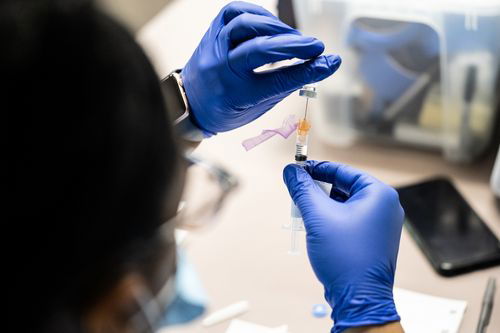Johnson & Johnson rare blood clot concerns deal new blow to global vaccination drive

Reports that the Johnson & Johnson Covid-19 vaccine may, in extremely rare cases, cause blood clots has dealt a fresh blow to the world’s vaccination drive, just weeks after similar concerns were raised over the vaccine developed by AstraZeneca and Oxford University.
On Tuesday, Johnson & Johnson said it would suspend shots across the United States while federal health agencies investigated a small number of unusual clotting cases, a move that some experts fear will erode vaccine confidence.
Only six out of more than 6.8 million Americans experienced clots — fewer than one in a million. All were women.
Outside of the US, Johnson & Johnson said it would delay the rollout of its vaccine in Europe, where several countries were due to begin administering shots this week. South Africa, which has been hit hard by a more contagious variant of the virus, has halted use of the Johnson & Johnson vaccine as a precautionary measure. Australia said it will not purchase any doses from the company, citing concerns over it being the same type as the AstraZeneca vaccine.
The clotting concerns about the single-dose Johnson & Johnson vaccine closely mirror those over the AstraZeneca shot, which also uses adenovirus vector technology to stimulate an immune response. It is not known whether that technology causes clotting.
Last month, drug regulators in Europe, the United Kingdom and Australia began examining the AstraZeneca vaccine after some recipients developed unusual blood clots with low platelet counts, similar to those of the Johnson & Johnson recipients.
On April 7, the European Medicines Agency (EMA) concluded that there was a possible link between the AstraZeneca Covid-19 shot and rare blood clots, but stopped short of recommending its use be limited. The benefits of the shot outweigh the risks and Covid-19 is a “very serious disease,” it added.
UK regulators took a more cautious approach, saying healthy adults under 30 should be offered other vaccines. Officials described the move as a “course correction” that would not derail the country’s rapid inoculation program.
Australia, meanwhile, issued a blood clot warning on the AstraZeneca vaccine for people under 50.
AstraZeneca has not yet been authorized for emergency use in the US.
The Johnson & Johnson delay marks yet another major setback for Europe’s vaccination efforts, which have been dogged by supply chain shortages, logistical issues and concerns over the AstraZeneca vaccine. Despite the EMA guidance, some European countries have restricted AstraZeneca’s use for younger people or extended its suspension, while Denmark has stopped its distribution entirely.
The EMA said Wednesday that it was “expediting” the evaluation of “very rare cases of unusual blood clots with low platelets” that occurred in the US, working closely with the US Food and Drug Agency, and expected to issue a recommendation next week.
While its review is ongoing, the agency told European Union (EU) member states that it still believed the benefits of getting shots into arms outweighed the risk of side effects. The EMA leaves decisions about national vaccination campaigns to the 27 member states of the bloc.
The EU ordered 200 million doses of the Johnson & Johnson vaccine in 2021 and authorized its use on March 11, but has not yet started widespread distribution.
An EU official told Reuters that the European Commission is seeking “urgent clarification” from Johnson & Johnson over the company’s “unexpected” delays to deployment across Europe.
France said Wednesday that it will move ahead with administering the 200,000 doses of the Johnson & Johnson vaccine it has received.
The UK has ordered 30 million doses of the Johnson & Johnson vaccine, but has not yet authorized its use.
Revelations that both the Johnson & Johnson and AstraZeneca Covid-19 vaccines may have rare side effects could also have enormous implications for low- and middle-income countries.
Those two vaccines — which are cheaper and easier to store and transport than mRNA-based vaccines Pfizer and Moderna — are seen as crucial to immunizing developing nations. Both have pledged to sell hundreds of millions of doses through the COVAX initiative, a vaccine-sharing scheme affiliated with the World Health Organization.
The Johnson & Johnson news is particularly painful for South Africa, which was forced to ditch its AstraZeneca vaccination campaign in February after a small preliminary trial showed that the shots offered minimal protection against mild to moderate illness caused by the country’s dominant variant of the virus. The government quickly pivoted to the Johnson & Johnson vaccine, announcing that it had secured 9 million doses at $10 a dose.
On Wednesday, South Africa’s Health Minister Zweli Mkhize said that the government’s downpayments to Johnson & Johnson were not refundable, a day after the country suspended the vaccine, citing recommendations by US regulators.
“As government we have found ourselves in a precarious position of having to choose between saving our citizens’ lives and risking putting the country’s assets into private companies’ hands,” Mkhize said. He added that the pause to the Johnson & Johnson rollout was not likely to last long.